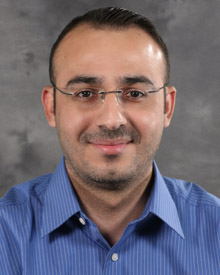Office: DSCH 348 | Phone: (308) 865-8370 | Email: qolomanyb@unk.edu

Basheer Qolomany, who joined UNK in Fall of 2019, conducts interdisciplinary research that lies at the intersection of evolutionary computation, artificial intelligence, machine learning, deep learning, and big data analytics in support of population health, cybersecurity, and smart services. He previously taught at Kennesaw State University and Western Michigan University. He is passionate about solving problems that use large heterogeneous data streams from varied sources, including news feeds, social media, public health data, clinical health, genome sequencing data, IoT data, and digital health tools to predict, diagnose, intervene, and solve problems in the health care arena. To better help those affected by peripheral artery disease(PAD), Qolomany and his team received a University of Nebraska Collaboration Grant to research, detect, and monitor PAD using machine learning which tracks patient gait signatures. He is a member of the Association for Computing Machinery and the Institute of Electrical and Electronics Engineers. He presents at conferences, writes for journals and trade publications, and professionally reviews journal articles.
Ph.D., Computer Science, Western Michigan University
M.S., Computer Science, Western Michigan University
M.S., Computer Science, University of Mosul
B.S., Computer Science, University of Mosul
Evolutionary computation
Artificial intelligence
Machine and deep learning
Big data analytics
Smart health
IoT based Smart Services
Discussing how to solve an interdisciplinary complex problem during a research meeting with a team from different fields.
I’m self-motivated and have a passion to learn and keep up to date, which means I read and interpret a lot of different material because my research work is interdisciplinary. Studying and learning about concepts and ideas from other fields, such as biology, physics, social science and psychology, helps me understand real-world problems and find solutions.